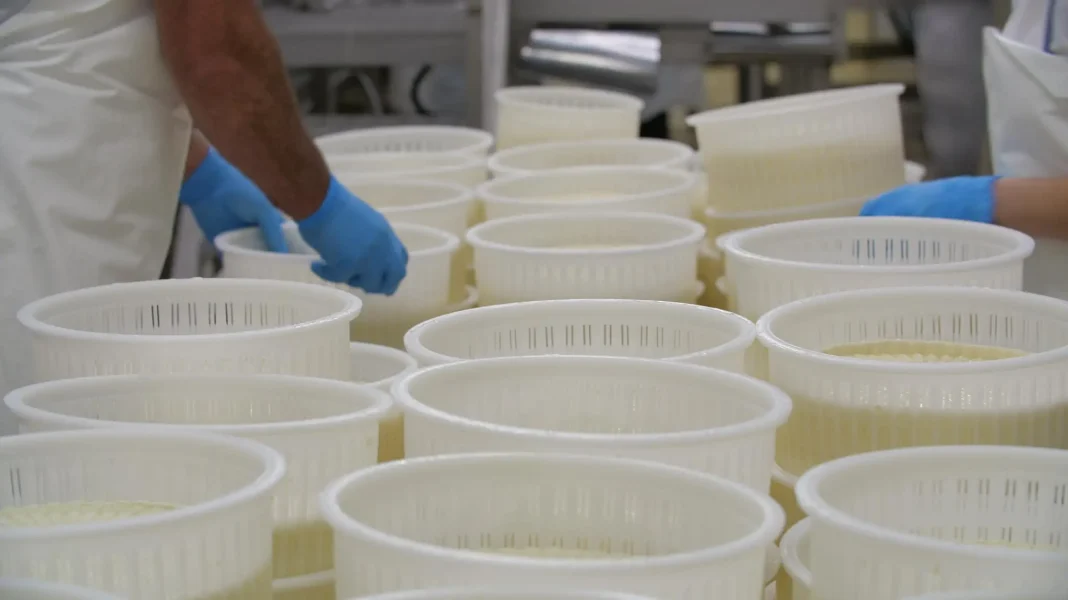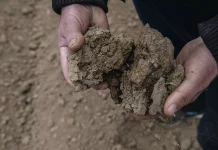By Esmeralda Topi – 15/07/2025
Nebiu* travels from Gjiri i Lalzit to Tirana. In his car trunk, there are no seafood, fish, or imported products with colorful packaging. Only canisters filled with milk from five cows he raises with great effort. For years, his routine had been the same: he would stop by Vali’s shop in a Tirana neighborhood, drop off the milk for his loyal customers, and return home with some money to support his family. But that changed this Monday.
Vali, the shop owner, no longer accepts his milk.
‘They are asking me for an invoice. I do not want trouble with the tax authorities’, she told Nebiu briefly. This is not an isolated case.
In Baldushk village, Agron* keeps a herd of goats. For some time, he delivered his milk to an agritourism business that turned it into cheese. ‘Now they tell me I need to provide an invoice’, he says. The local veterinarian, the only official who has visited Agron’s small farm, told him bluntly: ‘No one issues invoices. You are not a registered business’.
At the beginning of July, the government announced a joint operation between the Ministry of Finance, Ministry of Agriculture, and the Tax Administration focusing on food safety and informal activity in the food and agriculture sectors. The operation aims to formalize the agri-food economy, improve product traceability, and guarantee consumer rights for safe, regulated products.
‘We cannot allow consumers to be sold food products without invoices anymore’, declared Prime Minister Edi Rama on July 2 during a discussion on agriculture and rural development.
‘After a short two-week awareness campaign, the seizure of all un-invoiced food products will begin’, Rama added.
Action Without Awareness
Contrary to what the Prime Minister announced, the Tax Administration limited the awareness campaign to just one week.
‘Starting today (July 7, 2025), the Tax Administration informs that after analyzing the data on commercial activity in this sector, it will conduct a one-week awareness campaign targeting businesses through its communication channels and informative field visits to promote compliance with the legal obligation to issue fiscalized invoices for the products they sell’, the tax administration’s announcement stated.
One week later, the approach changed from awareness to enforcement.
‘The obligation to issue tax invoices for every sale of food products, including agricultural and livestock goods, also applies to farmers’, the Ministry of Agriculture and Rural Development announced.
The initiative requires that every food business operator, including farmers selling their own produce, must issue a tax invoice for every sale. Experts explain that these measures are legal obligations stemming from European integration.
‘There are four phases designed by agricultural policy in coordination with the EU to minimize business closures upon EU accession. In countries like Poland, Bulgaria, Romania, and Croatia, integration led to the closure of around 80% of processing operators’, explains Ilir Pilku.
How can Albania avoid a similar outcome? Pilku emphasizes the need for awareness-raising.
‘Organizing awareness programs for small producers on EU standards, including hygiene regulations, animal-origin product rules, and official inspections. Secondly, voluntary preliminary inspections by the Food Safety and Veterinary Agency (AKU) or municipalities to identify infrastructure and procedural gaps. Thirdly, training personnel on personal hygiene, good manufacturing practices, traceability, and HACCP basics. Lastly, creating communication networks to share best practices among processors’, Pilku concludes.
However, farmers, traders, and consumers have largely remained uninformed. This has been made evident not only by Nebiu and Agron’s experiences but also by a viral video showing a wild oregano seller in Saranda.
Invoice, invoice, invoice…
According to Law no. 92/2014 ‘On Value Added Tax’, farmers selling agricultural products are not required to issue tax invoices. They must register only with the tax authorities, without being obliged to register as businesses with the National Registration Center (QKB), maintain accounting records, or issue invoices.
This exemption is also confirmed by Law no. 87/2019 ‘On the Invoice and the Circulation Monitoring System’, which states that the responsibility to issue the invoice lies with the buyer of the product, usually the collector, aggregator, or processor.
A self-invoice (autofatura) is issued by the buyer (processor or collector) on behalf of the seller (farmer) when the farmer has a tax identification number (NIPT) and makes sales without VAT invoices for turnover up to 10 million LEK per year.
However, in practice, many buyers refuse to issue self-invoices because they no longer benefit from the previous VAT compensation scheme. Under recent changes, purchases from farmers are taxed at 0% VAT, while sales are taxed at 20%. This situation prevents collectors and processors from recovering VAT, leading them to avoid formalization, and effectively closing the market for producers.
Therefore, the recent enforcement action directly targets processors and collectors of agricultural products. According to tax administration instructions, these entities must use self-invoices to document purchases from farmers, as informality in this sector has been found to be high.
Conclusion
Since 2014, the livestock population in Albania has decreased by over 45%. The country now has fewer cows, fewer sheep, fewer goats, and produces less meat and milk. However, it seems there will be more invoices. Instead of aiding local production, the state demands accountability for a system that, according to the law, is the responsibility not of the farmer but of the collector or processor. Yet, the latter refuses to issue invoices because they lose money under the VAT scheme.
In the absence of a support system for small producers, Albania is heading toward increased imports of dairy products and the destruction of the remaining livestock sector.
Meanwhile, the recent enforcement action, carried out without genuine awareness campaigns, training, a clear transition plan, or any technical or financial support for farmers, will result in penalties. In a context where institutions have repeatedly failed over the years to foster a culture of formalization, the strict invoice requirement becomes a burden. Without awareness, the law’s implementation feels more like punishment than reform. And like any initiative imposed through force rather than understanding, it risks failing not only to its objectives but also to the justice it claims to bring.
‘Names have been changed to protect the privacy of the farmers who shared their stories with Faktoje.al.










